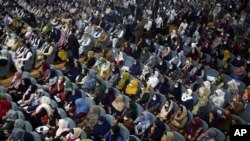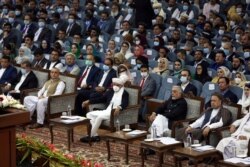A traditional public assembly, known as a Loya Jirga, opened in Afghanistan Friday to determine whether a last set of 400 hard-core prisoners from the Taliban insurgency should be freed to clear the way for long-awaited direct peace talks between Afghanistan’s warring sides.
Afghan President Ashraf Ghani argued in his speech as he convened the meeting that because the prisoners in question are convicted of “serious crimes” he was not empowered under the law to set them free without consulting the nation.
“(The) Taliban have promised that within three days of the release of these 400 prisoners they will begin direct negotiations with the government and agreeing on a permanent cease-fire will top the agenda of these negotiations,” Ghani said. He cautioned the jirga participants, however, that the Taliban has threatened to continue with their violent campaign if these inmates are not released.
Afghan officials said that more than 3,000 delegates, including tribal elders, leaders and politicians, are attending the consultative assembly tasked to advise the government on what to do about the prisoners. Around 700 women are also among the participants in the meeting that is expected to remain in session for several days.
A landmark deal the United States sealed with the Taliban in February to end a nearly 19-year-old Afghan war called for immediately opening peace talks on the condition that Kabul release 5,000 insurgent prisoners in exchange for 1,000 government security personnel that the Taliban was holding captive.
The insurgents have already freed all the prisoners they were to release in a phased process that concluded a week ago. The Afghan government has released all but 400 Taliban inmates, saying they have been convicted of serious crimes, including murders.
Afghanistan’s chief peace negotiator, Abdullah Abdullah, also addressed the Jirga meeting, stressing that the only way toward for resolving the conflict is through “honest and direct” talks to end Afghans’ suffering.
“I hope you decide about the fate of the 400 Taliban prisoners during the first day of your deliberations. We have to remove all the remaining obstacles and start the long-awaited intra-Afghan talks as soon as possible,” said Abdullah, a political rival-turned-governing partner of Ghani.
Washington is pushing all sides hard to finish the prisoner exchange and get the talks started to end to years of bloodshed.
“We acknowledge that the release of these prisoners is unpopular,” U.S. Secretary Mike Pompeo said in a statement on the eve of the Afghan jirga meeting.
“But this difficult action will lead to an important result long sought by Afghans and Afghanistan’s friends: reduction of violence and direct talks resulting in a peace agreement and an end to the war.”
In his Friday speech, Ghani stopped short of blaming the U.S.-Taliban pact for the controversy surrounding the prisoner swap. The U.S. excluded the Afghan government from the dialogue with the Taliban that led to the signing of the February 29 agreement in Doha, Qatar.
“I will say very clearly that the problem is not in numbers. We are not part of the agreement that was signed in Doha between U.S and Taliban,” said the Afghan president.
U.S. special reconciliation envoy for Afghanistan Zalmay Khalilzad, who negotiated the deal with the Taliban, stressed Friday that Afghan parties are ready to embark on a political process to negotiate a settlement and they all must seize the “historic opportunity” to end decades of hostilities in the country.
In a series of tweets issued just before the Loya Jirga started in Kabul, the U.S. envoy cautioned the participants not to further complicate matters ahead of the impending peace talks.
“Afghans have waited far too long for this moment. We wish the Jirga participants success in their discussions and urge them not to allow those who prefer the status quo and seek to complicate the path to peace to manipulate the process,” Khalilzad stressed.
The Afghan-born American diplomat has previously warned that Islamic State terrorists and other militant groups operating in Afghanistan are opposed to the peace process and intend to derail it.
As part of its commitments under the deal with the Taliban, the Trump administration has reduced the U.S. military presence in Afghanistan to around 8,600 troops before staging a complete withdrawal along with all coalition partners by July 2021.
President Donald Trump said earlier this week in a TV interview that the U.S. troop size in Afghanistan will reduce to “between 4,000 and 5,000” by election day in November.





